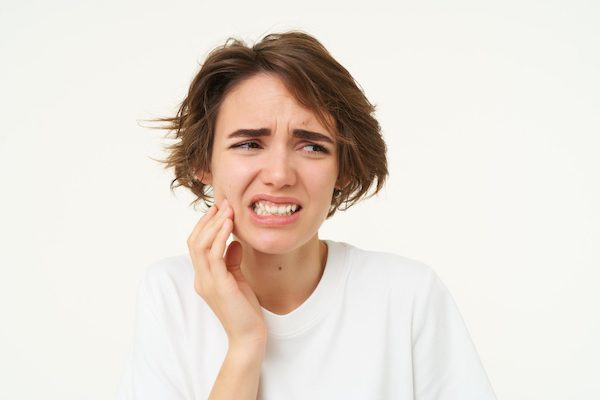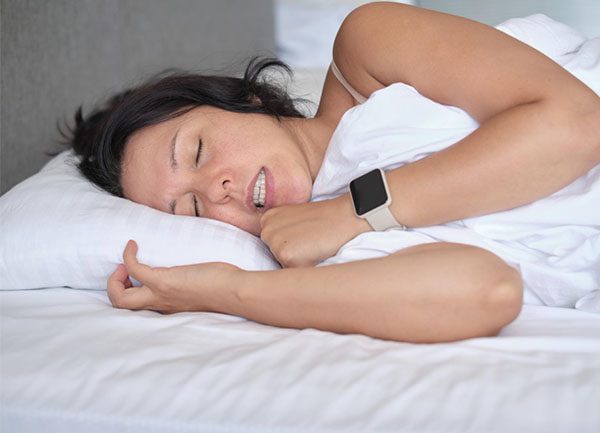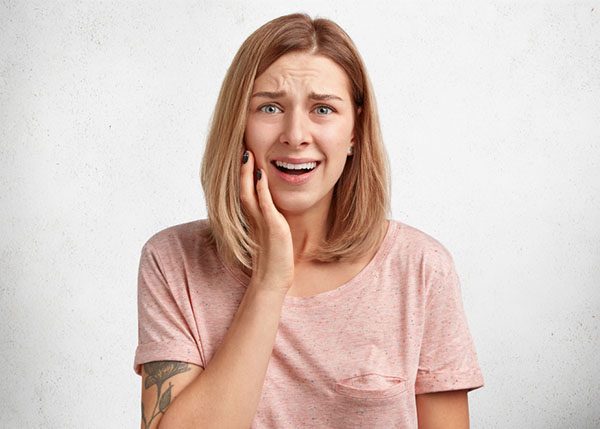Bruxism

Bruxism Seven Hills
Suppose you suffer from clenching or grinding or have a clicky jaw.
In that case, you should consult our dentists and discuss whether getting a customised occlusal splint (a therapeutic device to alleviate these symptoms) suits you.
We may also refer you to Ear, Nose, Throat, or Sleep Specialists for further investigation.
What is bruxism?
Bruxism is the grinding of teeth and continuous clenching of the jaw. This oral parafunctional activity means it has no functional purpose in how humans use their teeth, not as an eating or speaking tool.
Bruxism is a relatively widespread issue; according to different studies, the percentage of people who experience it varies between 8 and 31%. Bruxism may manifest itself with little or no pain, so a person may not even realise that he has this disorder.
Bruxism has various signs and symptoms, including sensitive teeth, muscle pain in the jaws, and headaches. Its consequences may include tooth wear, damage or chipping, and dental work, including crowns and fillings.
Causes of Bruxism
Although the precise cause of bruxism is still unknown, several variables are thought to be involved:

Stress and Anxiety
The leading causes of bruxism are elevated stress and anxiety levels. Individuals under significant emotional stress may grind their teeth as a coping mechanism.
Sleep Disorders
Snoring and sleep apnoea are conditions associated with bruxism. Disrupted sleep patterns can lead to nocturnal teeth grinding.
Malocclusion
Malocclusion, or poor tooth alignment, can make the jaw muscles work harder, which might result in bruxism.
Lifestyle Factors
The risk of bruxism can be raised by smoking, drinking alcohol, using recreational drugs, and consuming caffeine and alcohol.
Medicines
Certain medicines, particularly antidepressants, can have side effects that include teeth grinding.
Genetic Factors
A family history of bruxism may increase the likelihood of developing the condition.
Symptoms of Bruxism
Identifying bruxism can be challenging, mainly if it occurs during sleep. However, several symptoms may indicate its presence:
- Worn Teeth: Flattened, fractured, or chipped teeth are common signs of bruxism.
- Jaw Pain: Persistent jaw pain or soreness, especially in the morning, can indicate nocturnal grinding.
- Headaches: Frequent headaches, particularly in the temples, may result from the strain of clenching and grinding.
- Ear Pain: Pain that feels like an earache but is not caused by an ear infection could be related to bruxism.
- Tooth Sensitivity: Increased sensitivity to hot, cold, or sweet foods can occur due to enamel wear from grinding.
- Tight Jaw Muscles: Tension or fatigue in the jaw muscles can signify prolonged clenching.
Diagnosing and Treating Bruxism
A dentist can diagnose bruxism through a comprehensive dental examination, including checking for tooth damage, jaw tenderness, and other symptoms.
The severity and underlying cause of the problem determine the several treatment options available:
Mouthguards and Splints
Custom-made dental appliances can protect teeth from the damaging effects of grinding. They are typically worn at night to prevent further wear and tear.
Stress Management
The chance of developing bruxism can be decreased by practising techniques like yoga, meditation, and counselling that assist in lowering tension and anxiety.
Behavioural Therapy
Learning and practising jaw exercises and proper mouth and jaw positioning can help reduce clenching and grinding.
Medicine
To treat bruxism symptoms, doctors may occasionally prescribe muscle relaxants, anti-anxiety medicines, or Botox injections.
Dental Correction
Orthodontic treatment or dental restorations may be necessary for individuals with malocclusion to correct bite alignment.
Lifestyle Changes
Managing bruxism can be aided by cutting back on alcohol and caffeine, giving up smoking, and practising excellent sleep hygiene.
Complications of Untreated Bruxism
Ignoring bruxism can lead to severe complications, including:

- Tooth Damage: Persistent grinding can result in cracked, chipped, or broken teeth, requiring extensive dental work.
- Jaw Disorders: Prolonged bruxism can aggravate temporomandibular joint (TMJ) conditions by producing discomfort and dysfunction in the muscles and jaw joint.
- Gum Recession: Excessive pressure on the teeth can cause the gums to recede, increasing sensitivity and risk of periodontal disease.
- Sleep Disruption: Fatigue and a lower quality of life can result from nocturnal bruxism, which can disturb sleep patterns.
Bruxism Treatments in Seven Hills
If you suspect you or a loved one may be suffering from bruxism, don’t wait for the symptoms to worsen. Schedule an appointment at My Local Dentists Seven Hills today to discuss your concerns and explore treatment options.
Early treatment might save more tooth harm and enhance your general health.
Call us on (02) 8605 1696 or request an appointment online.
We are located at Shop 55, (Ground Floor) Seven Hills Plaza, 224 Prospect Hwy, in Seven Hills.
FAQs
What is bruxism?
What causes bruxism?
Several things, such as stress, sleep issues, malocclusion, medicines, lifestyle choices, and genetic predisposition, can cause bruxism.
What are the symptoms of bruxism?
Common symptoms include worn teeth, jaw pain, headaches, ear pain, tooth sensitivity, and tight jaw muscles.
How is bruxism diagnosed?
A dentist can diagnose bruxism through a dental examination, assessing tooth wear, jaw tenderness, and other indicators.
What treatments are available for bruxism?
Treatment options include mouthguards, stress management techniques, behavioural therapy, medicine, dental correction, and lifestyle changes.
Can bruxism cause long-term damage?
Yes, untreated bruxism can lead to severe complications such as tooth damage, jaw disorders, gum recession, and sleep disruption.
Is bruxism common in children?
Yes, bruxism can occur in children, often due to factors like stress, malocclusion, and developing jaws. It usually resolves as they grow older.
Can lifestyle changes help manage bruxism?
Reducing alcohol and caffeine use, giving up smoking, and practising excellent sleep hygiene can all help control and lessen the incidence of bruxism.
